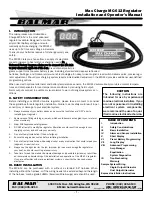
GENERAL EXERCISE GUIDELINES
SETTING
A GOAL
The first step to a successful exercise program is to set realistic
goals and objectives. Do you want an exercise program that is
geared to build muscle, maintain muscle tone, increase aerobic
capacity, or lose weight? In order to ensure that you fully receive all
the benefits of a sound exercise program, you need to first identify
the existence (if any) of risk factors that may influence the design
of your exercise program. Based upon a comprehensive analysis of
your personal exercise needs and interests, you should then
develop (or have developed for you by a competent or trained
professional) an individualized program of exercise that is
enjoyable, easy, and yet challenging. Your greatest health benefit
will come from a lifestyle change that encourages a lifetime of
physical activity.
One way to guarantee success in reaching your goal is to eat
correctly. A well-rounded diet provides the proteins,
carbohydrates, fats, vitamins, minerals, and water necessary for
good health. If you are unsure of your dietary needs, seek the
advice of your physician, an exercise professional, or visit your
local bookstore for more information on nutrition.
Flexibility Training
1
Achieving and maintaining an adequate range of motion should
always be objectives of a comprehensive exercise program. The
warm-up phase of your exercise session should include some type
of light warm-up activity to increase both your heart rate and your
body temperature, which is then followed by flexibility exercises
that are specifically designed to stretch the musculature around
your body’s major skeletal joints. Attempting to stretch a cold
muscle can be dangerous to the soft tissues surrounding the
muscle. No matter how controlled the movement, forcing a muscle
through a full range of motion (and beyond) without appropriately
warming up is both unsafe and counterproductive.
Page |
2
5









































